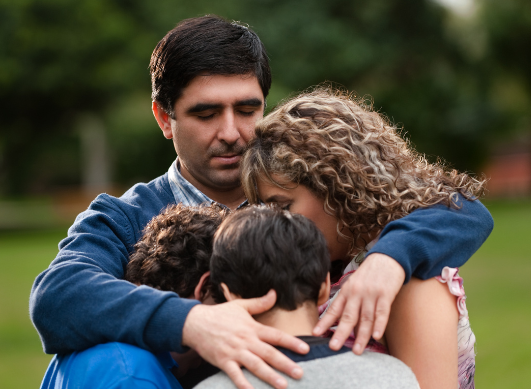Why it took my son eight years to be diagnosed with schizophrenia
Published 16 Dec 2015

As the 13.46 train pulled out that Christmas Eve, the genial, outgoing 20-year-old politics student was in effect leaving behind his sanity and travelling into the realms of fear and delusion. He arrived at his destination in a psychotic state, not knowing where he was or why he was there. He thought he was dead.
The festivities were overshadowed by his weirdness. “Sam was sleeping all day, eating all the Christmas food in the middle of the night and roaming around being a bit scary,” says his mother, Philippa.
“He thought he was starving to death, one of his many delusions. He was seeing things that weren’t there and hearing things that weren’t there.
“I was having a few days in Paris. When I phoned my mother-in-law she said: ‘Sam’s not at all well, is he?’ I thought she meant a touch of the flu. She said: ‘Well, he does behave very oddly, doesn’t he?’ I was puzzled. The one thing my son didn’t do was behave oddly. He was a very happy-go-lucky, normal friendly person who never caused any major upsets or worries. That phone call was when the world changed.”
Philippa Lowe cut short her break with her second husband, Mark, and travelled straight to Cheshire to find a confused, frightened young man she hardly recognised.
The local GP had prescribed an anti-psychotic drug for “some kind of thought disorder” and urged them to return home to see a psychiatrist.
By the end of January, Sam was extremely ill. “His overarching delusion”, says his mother, “was that he was not an ill person, but a wicked, wicked person. He thought he had committed terrible crimes and that I was his victim. He apologized over and over again whenever he saw me. Although he was in the psychiatric wing of a Surrey hospital, he thought he was in Broadmoor and that the nurses were guards. Can you imagine: all this happened in the space of days. It was entirely shocking, entirely frightening.”
In his distress, Sam cut his arms to punish himself. A nurse found him with a belt tied round his neck. He became obsessed by the fear that that his body had undergone changes. After three months as a psychiatric patient, he entered a phase of “something like normality” and went back to Portsmouth University to repeat his third year, only to fall ill again just before his finals.
More and different delusions crowded in. A school friend reported that he had put all his CDs out onto the balcony of his flat because he was convinced they were emitting noxious fumes. “When a terrorist bomb went off somewhere, he would say ‘Did I cause that, Mum?’, or ‘It wasn’t my fault, was it?’ He blamed himself for all ills.”
Equally worrying was his lethargy and lack of concentration. He had no short-term memory and had become almost monosyllabic. Even getting out of a chair required huge effort. On one occasion, he walked out in front of a taxi and fractured his leg.
“Sorry, Mum, I just didn’t look,” he said. Later, he admitted he couldn’t have cared whether he lived or died. At times, he would ask: “Are you really my Mum, or are you an imposter?”
There had been no apparent trigger for his psychosis, no genetic history of schizophrenia, no childhood trauma or abuse. One possible explanation is that Philippa contracted flu when she was four months pregnant – and there were birth complications.
For the next seven turbulent years, the family received seven different “diagnoses”, none of them advancing the true explanation for Sam’s aberrant behaviour and mental trauma. “I came to realise that they were not diagnoses at all,” says Philippa. “They were descriptions of his symptoms, such as OCD [Obsessive Compulsive Disorder] or depression with psychotic features.”
Her bewilderment only began to lift when Sam was admitted to hospital for a third time in 2004 and a locum psychiatrist tentatively used the word “schizophrenia” for the first time.
“That was enough. We were away and motoring,” says Philippa, a former psychologist. “I started to research the condition and everything fell into place – the mood disorders, the negative symptoms, everything. When Sam heard he might have schizophrenia, he said an amazing thing: ‘I’m very pleased. At last I’ve got a hook to hang my hat on. At last I know it’s not my fault. At last I know I’m not alone.’ That’s exactly what I was feeling.”
Her breakthrough was discovering the charity Rethink Mental Illness, which provided the information and support that had been lacking for so long. Finally, she understood that Sam’s lethargy, his inability to concentrate, to analyse things or to forge relationships (the so-called negative symptoms) were as much part of his condition as the delusions.
“It’s only when you understand the full story that you can get the appropriate help. Suddenly I belonged to a community that could offer advice and support. I realised that the stigma surrounding mental illness was felt by everyone and needed to be challenged. I met people worse off than I am: people with more difficult children, people whose children have died.
“Rethink fulfilled my need for the company of like-minded people who had similar experiences – the same obstacles, the same lack of information, the same feelings of stigma and aloneness before they met other carers.”
At a Rethink reception at the House of Lords in 2005, Philippa buttonholed a professor from the National Psychosis Unit with the plea: “My son has schizophrenia but no one will diagnose him.” He agreed to help. His diagnosis, as she suspected it would be, was schizophrenia.
When another psychiatrist came to examine Sam’s medical history in 2012, he found that the word “schizophrenia” had been used by doctors in four separate reports over the years – yet the family had never been told. “I felt terribly let down. This whole journey could have started eight years earlier.”
Sam is 39 now, living independently with the help of stabilising drugs and a huge amount of support, including a personal assistant. He works in a charity shop two hours a week, an achievement unimaginable several years ago.
Though he is still assailed by doubts and anxieties, he has not been in hospital since 2008. His long-term memory is phenomenal and he is fascinated by history. He signed up for an adult education history class and is now doing a course on forensic science. “It’s taken nearly 20 years to get here,” says his mother.
“Because of what has happened to him since he was a student, it means an awful lot to him that he did go to university. It is an important part of his identity. He will ask: ‘Mum, I did go to university, didn’t I? I did do all right?”
Inevitably Philippa feels she has lost a large part of the boy he was. “But I’ve got some of it back”. They are closer now than ever. “He’s so dependent and I need to look out for him. He rings me several times a day, wanting to know where I am, if I’m all right. He’ll be 40 in August. He has lost two decades. The saddest thing is that people like Sam don’t have the things that others most value in their lives – a partnership, a family, a career. He always wanted to marry and have a baby”.
Mother and son meet up each week. He spends every third weekend with her and they go on holiday together. She is proud of Sam’s achievements and of the way people warm to him.
“He is still nervous. Getting to those classes, going to the shops, is a feat of bravery. There is an assumption that people with schizophrenia are violent. They rarely are. Sam has never been frightening in the violent sense. He is oblivious to stigma and has attracted little because he is such a sociable person. Everyone loves him and greets him.”
When her husband Mark died in 2004, Philippa devoted more and more time to Rethink, becoming a member of the London regional committee. Now, aged 72, she is the charity’s chair.
She has the support of Sam’s father, Patrick, in ensuring their son’s well-being. “I deal with doctors. Patrick deals more with the technical side. Sam loves it: Mum and Dad. He’ll say: “ When you come over on Wednesday, we’ll go out for one of those Thai meals and it’ll be like old times. Who could deny that?”
She says that Christmas can never be the same again because it is a painful reminder of Sam’s descent into mental illness – but there are blessings to count.
“Though the whole story is absolutely horrific, I’ve been spared some of the things others have experienced. Sam is much better. He’s is extremely attached and affectionate, and he doesn’t try to hide himself away. He’s a joy in many ways.
“But we do now have to teach him some independence because one day I’m going to die, and maybe become less able before that. It’s every parent’s job, isn’t it? If you have a disabled child, particularly one who is mentally ill, that job is much harder.”
The Telegraph
Comments
You will also like

Fighting schizophrenia symptoms: a long journey against paranoia after detainment and denial
12 Dec 2018 • 7 comments
See the testimonial
See the testimonial

 Facebook
Facebook Twitter
Twitter

